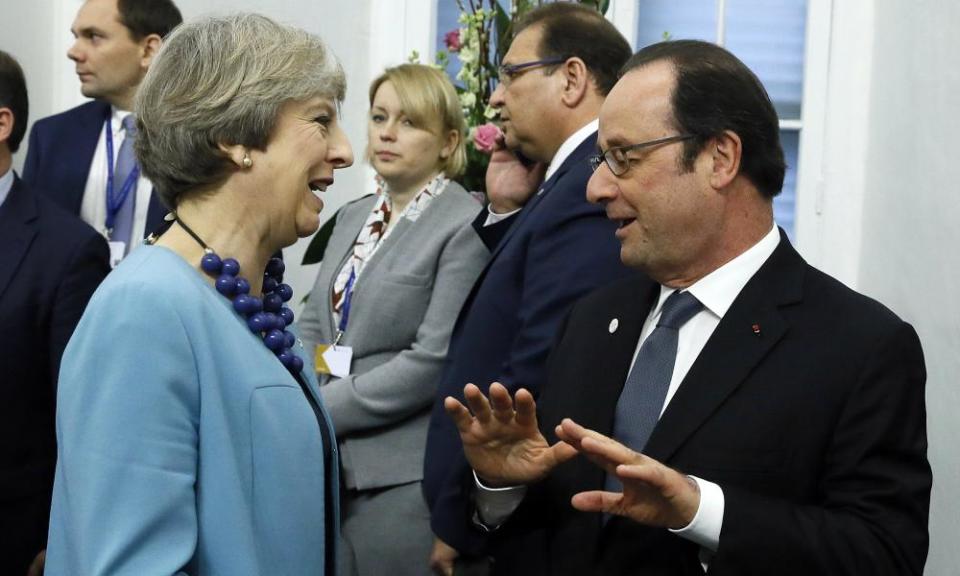Hollande to May: agree Brexit terms first, then we'll talk trade

François Hollande has told Theresa May the EU is not prepared to discuss Britain’s future relationship with the bloc until the conditions of its exit have been agreed.
The French president used a phone conversation with the prime minister on Thursday to echo remarks by the European council president, Donald Tusk, and German chancellor, Angela Merkel, that trade and divorce talks could not be held in parallel.
Meanwhile, May published articles in five European newspapers that linked security cooperation with the Brexit talks, reiterating the controversial position taken in her article 50 letter on Wednesday.
According to a statement released by the Elysée Palace, Hollande told May: “First we must begin discussions on the modalities of the withdrawal, especially on the rights of citizens and the obligations arising from the commitments that the United Kingdom has made.
“On the basis of progress made, we could then open discussions on the framework of the future relations between the United Kingdom and the European Union,” he said, calling for clear and constructive talks that respected the rules and interests of the EU.
Merkel said on Wednesday that the negotiations “must first clarify how we will disentangle our interlinked relationship … and only when this question is dealt with can we – hopefully soon after – begin talking about our future relationship”.
Downing Street said the government saw Merkel and Hollande’s stance as a negotiating tactic. “It’s the beginning of the negotiation. We expected robust positions to be taken at the start and let’s see where we get to,” a spokesman said.
“We believe the negotiation should take place in parallel. Our position is clear. And it does make clear in article 50 that the future arrangements for the country leaving should be part of the framework for the article 50 process.”
No 10 said May had spoken by phone on Thursday to the leaders of France, Poland, Italy and Spain, as well as the president of the European parliament, Antonio Tajani.
Articles written by the prime minister were published in several European newspapers on Thursday morning, including the Irish Times, Frankfurter Allgemeine Zeitung in Germany, and le Parisien in France. In near-identical pieces, she said security cooperation remained vital, but indicated it would be part of the new discussions.
“In an increasingly unstable world, that collaboration is more, not less, important for us all,” she wrote in the Irish Times. “I want the UK’s new relationship with the EU to ensure that – whether it comes to exchanging the information our security services need, or working together to protect Europe’s borders – we have the closest possible relationship.”
In her six-page letter triggering article 50, which was formally presented to Tusk by the UK’s ambassador to the EU, Sir Tim Barrow, on Wednesday, May said she believed it was “necessary to agree the terms of our future partnership alongside those of our withdrawal from the European Union”.
But the EU institutions and 27 remaining member states have long said the details of the divorce settlement, such as the rights of EU citizens in the UK and Britons on the continent and the size of Britain’s exit bill, must be agreed before substantive talks on a future relationship can begin.
Downing Street said the government did not know how long it would take for the negotiating stances to be decided. “Our position is we are ready to start negotiating,” the spokesman said.
He reiterated that May was aiming for a comprehensive deal, with trade and security as part of a whole package. “We are looking to negotiate as a whole. We want a comprehensive deal of all aspects of our relationship with the EU.”
He added that feedback from May’s European counterparts about her article 50 letter was that the “tone of the letter was appreciated and considered to be constructive”.

 Yahoo News
Yahoo News 